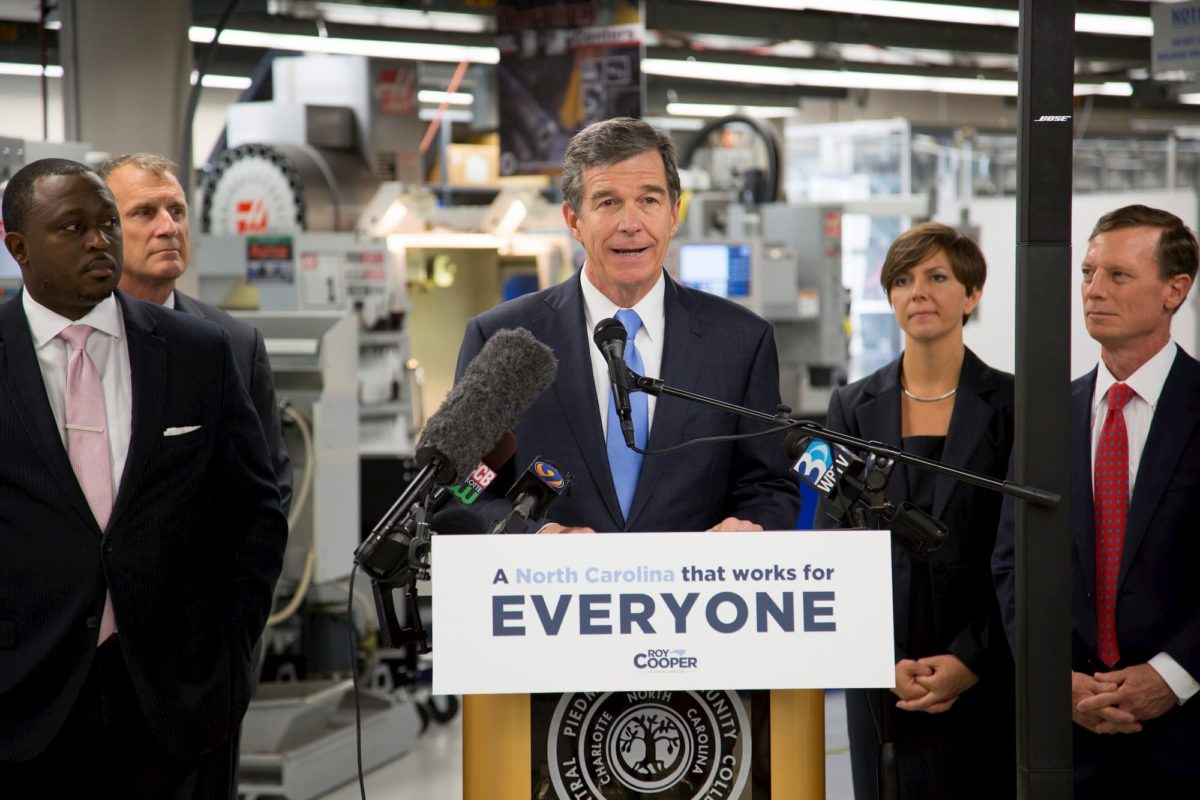Key actions and positions posted on the intersection of disability and education, jobs, immigration, climate crisis, criminal justice and more

Raleigh, N.C., Sept. 11 – Incumbent Democratic Gov. Roy Cooper has responded to a detailed candidate questionnaire on disability issues. The questionnaire is from RespectAbility, a nonpartisan nonprofit disability organization that does not endorse candidates. The questionnaire is purely for educational purposes. RespectAbility has reached out to key Senate and gubernatorial campaigns on both sides of the aisle and will be posting all responses on The RespectAbility Report. The full text of RespectAbility’s questions and Gov. Cooper’s responses follows:
1. Learning during the COVID-19 pandemic has led to more issues and concerns for all students and their families, but this is especially true for students with disabilities. Additionally, the gap in graduation and drop-out rates between students with and without disabilities continues to undermine their futures. For example, in the class of 2018, only 66 percent of Black students with disabilities, 71 percent of Hispanic students with disabilities, 77 percent of white students with disabilities, and 79 percent of Asian-American students with disabilities completed high school. Furthermore, just seven percent of students born with a disability graduate from college. What is your plan for ensuring that all students with disabilities receive a quality and appropriate education to acquire the critical and marketable skills necessary to compete in a job-driven economy?
As we begin an unprecedented school year, we need to make sure we are supporting our students with unique learning needs. That’s why I directed $95.6 million in new funding to help support K-12 and postsecondary students most impacted by the COVID-19 pandemic who can benefit from support.
My office has made major strides in the Leandro case, which addresses the disproportionate funding and underfunding of our schools. The state in that case has agreed to lift the cap on funding for students with disabilities and increase funding by more than $460 million over the next eight years, and we will work to get that done. As a downpayment on those investments, I included $6.2 million in state funding and $17 million in federal funding to provide more supports to students with disabilities.
2. In the economic expansion prior to the COVID-19 pandemic, the national employment rate for working-age people with disabilities in America was 37.6 percent compared to 77.8 percent of people without disabilities. Further, there continues to be significant disparities in employment outcomes within the disability community, which varies from state to state. There are significant racial disparities in disability employment outcomes. 38.9 percent of working-age white people with disabilities have jobs compared to only 29.7 percent of working-age Black people with disabilities had jobs, 39.4 percent of working-age Hispanics with disabilities and 43.2 percent of working-age Asian-Americans with disabilities. The pandemic has ravaged the disability community and more than 1 million workers with disabilities have lost their jobs. If elected, what will you do to ensure that the government is removing barriers and promoting high quality, inclusive services built on evidence-based policies, practices and procedures leading to competitive, meaningful careers, which includes promoting entrepreneurial opportunities?
North Carolina is at its best when all people have the opportunity to achieve their potential and live lives of purpose. In 2019, I signed Executive Order 92, Employment First for North Carolinians with Disabilities, to increase opportunities for fair wages, employments, and careers for individuals with disabilities. I directed state government to lead in recruiting and creating an inclusive job environment for workers with disabilities.
The Executive Order directs the North Carolina Office of State Human Resources to collaborate with the Department of Health and Human Services to enhance recruitment and outreach efforts to potential workers with disabilities and to identify and attract qualified individuals with disabilities for state employment.
Increasing employment for people with disabilities increases independence, and is good for businesses with lower employee turnover, increased productivity and access to a broader pool of skilled workers.
In partnership with North Carolina Business Committee for Education (NCBCE), I also launched the Linking Inclusion in Information Technology (LiNC-IT) internship program, an innovative work-based learning program that provides internship opportunities in technology for individuals with autism spectrum disorder.
3. The disability community fundamentally believes in the need to ensure “Nothing about us, without us” – real inclusion and places at decision making tables – because we know solutions that work and want to be a part of making our communities stronger. What specific measures have you taken to make your campaign accessible for, and inclusive of, people with disabilities, as every issue impacts our lives?
As governor, I have worked to make sure our state is a national model for diverse workplaces. It’s part of why I signed Executive Order 92, Employment First for North Carolinians with Disabilities and why I’ve directed state government to lead in creating an inclusive job environment for workers with disabilities.
During the pandemic, we have held regular press conferences to update North Carolinians on coronavirus developments and any weather events and make sure to have an American Sign Language interpreter. We have also made efforts to structure website content on COVID resources in a way that makes it more accessible for screen readers.
The way we campaign has in many ways been turned upside down, but there’s a bright spot in that. We’ve been able to focus our efforts on connecting with voters digitally, and making sure we are accessible to North Carolinians from all walks of life.
4. RespectAbility published Disability in Philanthropy & Nonprofits, based on our study on the levels of disability inclusion in the social sector across the country. This largescale study found significant data showing that nationwide, organizations overall want to be inclusive, but are unintentionally excluding the one-in-five people with disabilities. What will you do to promote policies and practices designed to support full community engagement, access and inclusion of people with disabilities?
I proclaimed July 25 as Americans with Disabilities Day in North Carolina to honor the more than 1.3 million North Carolinians who have a disability and honor the anniversary of the Americans with Disabilities Act.
The North Carolina Council on Developmental Disabilities launched Inroads to Employment, a program that works to help people living with intellectual and other developmental disabilities find employment. To date, the program has established mentorships and apprenticeships across the state. Inroads to Employment fills a gap for many young people living with disabilities who can have trouble developing employment skills through traditional means.
The Linking Inclusion in Information Technology (LiNC-IT) internship program is another example of promoting inclusion of people with disabilities.
Many of the issues people face with unconscious bias in hiring affect people with disabilities. We will work with Human Resources on training and awareness.
5. Elected officials have multiple opportunities to demonstrate a strong commitment to diversity and inclusion, full community participation and celebrating the contributions and accomplishments of people with disabilities through press releases, speeches, celebratory events including National Disability Employment Awareness Month. There are significant stigmas that create attitudinal barriers that limit options and perpetuates low expectations for people with disabilities. What measures will you take to combat these stigmas and promote opportunities for people with disabilities?
I honored and celebrated the many contributions and accomplishments by honoring National Disability Employment Awareness Month. There are significant stigmas that create attitudinal barriers that limit options and perpetuate low expectations for people with disabilities.
In my proposed budget for 2019-21, I directed the allocation of $1 million for state-of-the-art adaptive equipment and assistive technologies that can help North Carolinians who have disabilities live, work and learn more effectively in their communities.
6. In our nation’s public schools, there are 6.3 million students with disabilities. The changing demographics of America are reflected in these students, with 11.4 percent of students with disabilities nationwide, almost 720,000, also identified as English-language learners. Their accommodation needs are compounded by the fact that many come from households that do not speak English at home, adding an extra challenge for parental interaction. It can also be harder to diagnose disabilities in children when they are English language learners. Additionally, immigration issues and fears over the public charge rule impact students with disabilities, their families and the wider workforce. What policies would you advance to enable students and their families who are English language learners with disabilities to succeed in school and employment?
In 2018, my Department of Health and Human Services (DHHS) collaborated with NC Council on Developmental Disabilities to launch the Everybody Works NC campaign in October to raise awareness about the untapped pool of talented people with disabilities who are qualified and ready to work.
Also in 2018, DHHS hosted the nation’s first Health and Human Services Project SEARCH site, a collaboration with Wake Technical Community College that connects students with disabilities to internship placements within DHHS to provide on-the-job employment skills and experience.
7. Housing, criminal justice, climate issues, transportation and every other area have significant impacts on people with disabilities. What additional policies and priorities, other than those already discussed above, do you plan to focus on to improve the lives of people with disabilities?
I want all North Carolinians to be healthier, better educated, and have more money in their pockets. Individuals with disabilities often face barriers to these goals. I am committed to advocating for North Carolinians with disabilities to overcome these barriers. I look forward to seeking your continued advice as we fight for a North Carolina that works for all of us.
Gov. Cooper is facing off against Republican Lieutenant Governor Dan Forest in this year’s closely watched election. RespectAbility has contacted the Forest campaign about completing our nonpartisan questionnaire multiple times via email and we currently are waiting to receive their response.
RespectAbility is a nonprofit, nonpartisan organization that fights stigmas and advances opportunities so people with disabilities can fully participate in all aspects of their communities. RespectAbility does not rate or endorse candidates. View more coverage of 2020 candidates.

[…] Read Response in Full […]
[…] Cooper completed the 2020 Disability Voter Questionnaire for presidential, Senate and gubernatorial candidates put out by the national disability […]
[…] with disabilities by completing the questionnaire have won re-election. Democratic incumbent Roy Cooper has won a second term as Governor of North Carolina, beating Republican challenger Dan Forest. […]